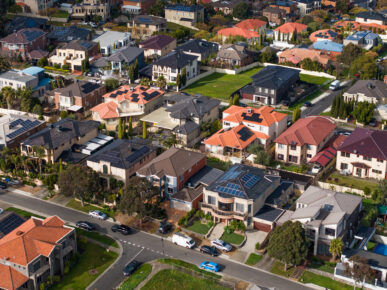Jump to
- What is the purpose of a property valuation?
- Who conducts a property valuation?
- What is a property valuation report?
- Types of property valuation reports
- What is the difference between a property appraisal and a valuation?
- Can I value my own property?
- What to do if you disagree with a valuation
- Can I dispute a valuation?
- Frequently asked questions about property valuation
A property valuation is a professional assessment of a property that determines its current real dollar value in the market. Nearly every type of property transaction needs a valuation — from someone buying their first house to major industrial and commercial real estate deals. Here’s what you need to know about what a property valuation is and how it works.
What is the purpose of a property valuation?
A property valuation serves all parties involved in a transaction by providing an independent analysis of a property’s true value. Valuations consider factors such as its condition, the state of the market in the area and the overall economy to determine how much a property is worth. The valuer will distil this analysis into a property valuation report.
Property valuations are pivotal for buyers and sellers in the residential property market. They help sellers determine how much to put a property on the market for and, just as importantly, how much a buyer needs to pay.
Lenders also use valuations as an instrument to decide how much someone can borrow for a home loan and under what circumstances.
Who conducts a property valuation?
Property valuations are conducted by a Certified Practising Valuer (CPV), who must undertake a training course and gain practical experience to achieve accreditation. They are required to be members of the Australian Property Institute, which sets the industry’s minimum standards for conduct and ethics. Certified valuers also need to complete ongoing professional development to ensure they are up to date with changes to property laws and regulations.
What is a property valuation report?
A property valuation report is a CPV’s final determination of the property’s fair market value. In simple terms, this final figure represents the amount the valuer reasonably believes the property would sell for in the current market.
The valuer prepares this document after completing the inspection and considering all relevant factors. Reports are generally available within a few days or weeks of being requested. However, they may take longer depending on the size and complexity of the property, the availability of all relevant online data and the valuer’s workload.
A property valuation report is a legally binding document for asset and taxation purposes. Still, nothing stops you as a seller from asking more, which often occurs in a hot property market, especially if a property goes to auction and there’s a bidding war.
When do you need a property valuation report?
There are several circumstances when you may need a property valuation, such as:
- buying
- selling
- refinancing
- establishing value for family or partnership arrangements
- estate planning
- valuing a deceased estate
- working out capital gains tax
- calculating stamp duty
- getting home insurance
- managing debt, defaults or repossession.
» MORE: Can you transfer a mortgage to a family member?
Types of property valuation reports
There are three main types of property valuation reports in Australia:
Full valuation
A full valuation, which is the most common and comprehensive, requires the CPV to inspect the entire interior and exterior of the property. Full valuations take about a week to complete, usually cost between $300 and $600, and last about 90 days.
The process involves a detailed inspection of the property and research into things such as the state of the current market and a variety of other factors. These may include:
- The age and condition of the property and whether it needs urgent renovations to be habitable.
- Size, including the entire land package.
- Number of rooms, including bedrooms, studies, living or dining rooms, kitchens, bathrooms, attics, basements and garages.
- Fixtures and fittings.
- Front and back yards.
- Building materials used.
- Floor coverings.
- The structure of the property, whether it’s standalone or part of a unit block.
- If strata reports were required for apartments.
- Local council zoning and restrictions for renovations.
- Sales history.
- Recent sales in the area.
- Rental value.
- The nature of the title and whether it is heritage-listed.
- Overall market conditions, such as interest rates.
- Proximity to amenities, such as shops, schools and public transport.
- If proximity to major roads and flight paths causes noise pollution.
- Regional risks, such as floods and bushfires.
Each of these factors can affect a property’s value in different ways. For example, a negative strata report — where a large amount of money was required for urgent renovations to common areas — will adversely affect a valuation. So would a sudden economic downturn due to a catastrophic stock market crash.
Lenders generally use full valuations for loans they deem riskier. For example, applications with a low deposit, certain types of mortgages, such as low-doc home loans, and unconventional property purchases, like when buying an off-the-plan property.
» MORE: Types of home loans in Australia
Desktop valuation
A desktop valuation does not require a physical inspection. Instead, the CPV simply uses publicly available data to estimate the market value of a property. Desktop valuations take only an hour or so to complete, are usually low in cost or available free of charge, and generally last 90 days but can sometimes extend beyond that.
This type of valuation is commonly used for loans deemed low risk — less than the 80% loan-to-value ratio (LVR) — because the lender is confident that the purchaser will be able to repay the mortgage regardless of the property’s condition.
Kerbside valuation
A kerbside (or ‘drive-by’) valuation requires the CPV to inspect the property from the street’s kerb. Kerbside valuations take a couple of hours to complete, typically cost between $100 and $120, and are valid for up to three months.
Like a desktop valuation, a kerbside valuation relies heavily on data to approximate the value. However, a kerbside valuation requires a visit to the property and inspection from the outside (or from the kerb) to obtain as good an impression as possible of its overall condition. So, while nowhere near as detailed and comprehensive as a full valuation, the kerbside process at least involves taking photos of the external parts of the property to bring any potential issues to light.
Kerbside valuations are usually only available to low-risk customers with a suitable LVR. If accurate data is available and you have enough equity, it may suffice when securing your mortgage or refinancing.
What is the difference between a property appraisal and a valuation?
A property appraisal differs from a property valuation in that it is not a legally binding document but merely an informal estimate of a property’s value. A real estate agent works out appraisals following a physical inspection of the property but in a much less detailed manner than a full valuation.
Appraisals also contain data such as recent sales and market conditions, but they are vaguer than comprehensive, legally enforceable valuation reports. Appraisals are intended more as a rough guide, or approximation, of how much you could get when selling your property.
» MORE: What is estimated market value?
Can I value my own property?
You can estimate the value of your property, but a self-assessment is not legally binding in the same way as a property valuation. However, estimating your property’s value or the value of a property you are interested in buying is possible — and often helpful.
Get a free property report
Countless websites can do much of the hard work for you by providing free information on property values nationwide. For example:
- Realestate.com.au uses all the market-leading data available on Australia’s largest real estate website to estimate your property’s value in less than a minute.
- Domain also provides price information for more than 13 million properties in Australia.
- Property Value offers users the same data that banks use when making valuations. The site also has a fairly comprehensive map feature that sorts prices, tracks price trends by neighbourhood, and covers more than 90% of Australian properties.
Finding this information online is pretty straightforward and can give you a clear picture of the neighbourhood and any changes to the market.
🤓 Nerdy Tip
Free property reports are not the same as property valuation reports and are not sufficient for lenders. Still, they can give you a better idea of what to expect, which is especially helpful when shopping around or before applying for pre-approval.
Research sales and price history
Looking into a property’s sales history can help estimate costs. These records can be a valuable guide to what it may sell for, depending on when it last sold — provided the sale wasn’t 20 years ago. Price histories can also give a clearer picture of the neighbourhood and accompanying changes to the market.
Finding a property’s sales history online is a reasonably straightforward process where you contact the relevant State or Territory office. These government departments record all residential and commercial property sales information, which is available to the public. They also contain information regarding previous title owners and when the property was sold.
🤓 Nerdy Tip
Learn more about your area’s market by viewing past property reports online (start by researching sites such as CoreLogic) and looking at as much data as possible for your area’s market.
What to do if you disagree with a valuation
A bank valuation is a necessary part of the whole home loan process, and the valuation may come in differently than you expect.
Sometimes, the valuation is lower than the seller is asking for the property, which, in turn, could affect your borrowing power.
For example, if you need $500,000 to buy a home and the valuation comes back at $400,000, you may only be able to borrow up to that amount. That means you will require a much larger deposit to make up the shortfall because the bank does not want to risk default and all the issues that could arise around that.
Conversely, the valuation may come back as more than the price the seller asks. That means you’re already ahead from a wealth-building perspective, and your foray into the real estate market is already paying off.
Can I dispute a valuation?
You can dispute a valuation if you think it is unfair. The process will involve a fair amount of research on your part to show that similar homes in the area have sold for more than the valuation shows, for example, or that the fittings and fixtures are worth more than the valuer has placed on them. However, doing this still may not bring you any joy, as the lender is not obliged to give you a loan for more than they want to.
You can also request that the lender use another valuer, though they may charge you for it, and there’s no guarantee that they will give you the result you want.
In such situations, you can either attempt to renegotiate the sale price of the property based on the valuation, try and find the funds to cover the shortfall (in other words, put together a bigger deposit) or simply wait until you’re in a better position to buy a property.
» MORE: 10 questions to ask your mortgage lender
Frequently asked questions about property valuation
Independent valuations usually cost between $300 and $600, depending on the size of the task and the time it takes to complete. For example, commercial and industrial property valuations are usually far more time-consuming and can run into the thousands of dollars. Either way, the valuer should provide the price information beforehand in a quote.
When buying or refinancing a property, the lender includes property valuation report fees in your overall buying costs. Sometimes, lenders waive these fees if your home loan is above a certain amount, if you’ve negotiated your mortgage or entered into a home loan package.
When selling a property, a real estate agent usually pays for the independent valuation, especially if they want your business, though you should always check first. To find a CPV, check the websites of the Australian Property Institute or the Australian Valuers Institute.
Property valuations are generally good for about three months. However, this varies considerably, and any changes to market conditions — such as the onset of a recession or worse or subsequent damage or renovations — will obviously affect the valuation. In which case, it’ll need to be repeated.
DIVE EVEN DEEPER

10 Questions To Ask A Real Estate Agent When Selling A House
Selling a house can be tricky, so working with the right people is crucial. Here are 10 questions to ask a real estate agent to see if they fit.

Mortgage Brokers in Australia: What They Do
A mortgage broker helps home buyers find a home loan and interest rate that fits their unique financial situation.

Townhouse vs. House vs. Apartment
Deciding to purchase a property is a big decision. As you weigh your options, comparing townhouses, apartments and houses can help guide you in the right direction.

Best Interests Duty: What Should Borrowers Know?
‘Best interests duty’ forces mortgage brokers to operate in the best interests of their clients instead of maximising commissions wherever possible.

